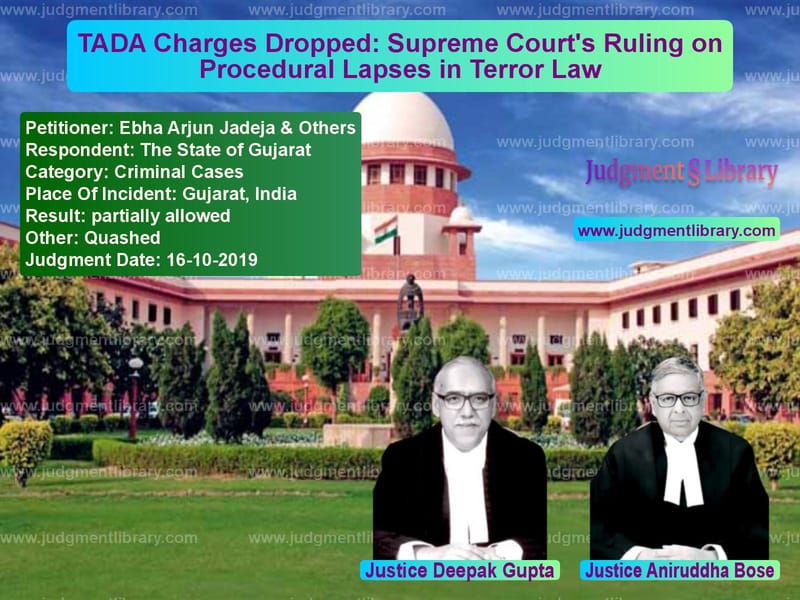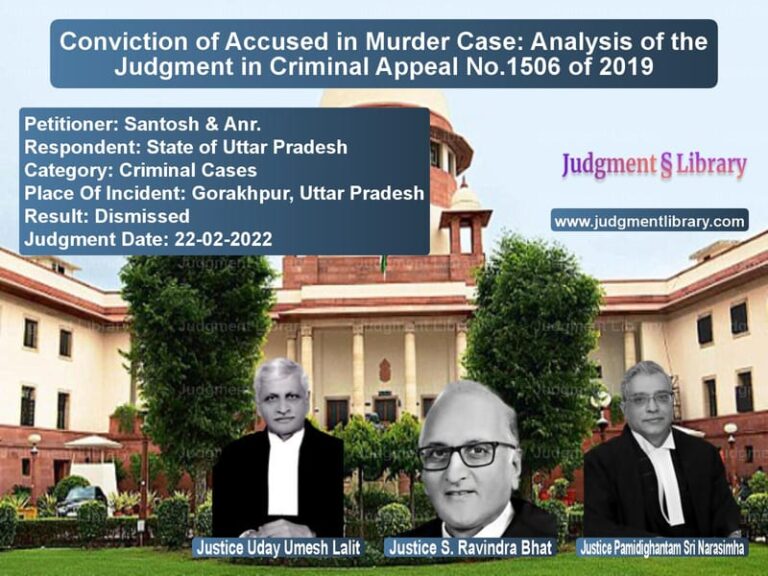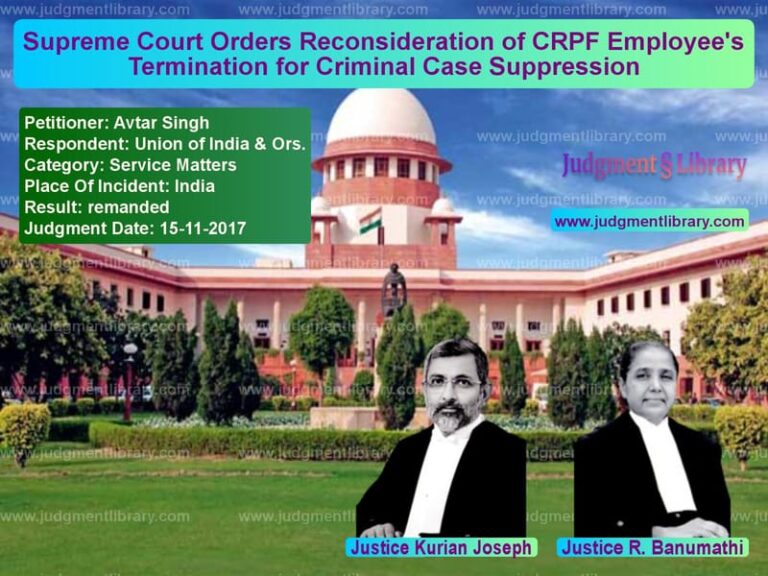TADA Charges Dropped: Supreme Court’s Ruling on Procedural Lapses in Terror Law
The case of Ebha Arjun Jadeja & Others vs. The State of Gujarat revolved around the application of the stringent Terrorist and Disruptive Activities (Prevention) Act, 1987 (TADA) and the necessity of obtaining prior approval before recording an offence under the Act. The Supreme Court’s ruling in this case significantly impacted the procedural application of TADA, reaffirming that strict compliance with procedural safeguards is essential before invoking its provisions.
Background of the Case
Ebha Arjun Jadeja, along with two others, was arrested on April 10, 1995, by the Gujarat Police. The police had set up a checkpoint based on intelligence that the accused, who was absconding in a prior case under the Arms Act, was returning to his village. Upon stopping and searching the vehicle, the police recovered:
- A 9mm Beretta pistol and three live cartridges.
- A .32 bore revolver and five live cartridges.
- One country-made 315 bore pistol and one country-made 12 bore pistol.
Initially, the FIR was registered under the Arms Act, 1959. However, on the same day, the District Superintendent of Police (DSP) granted sanction to add Section 5 of TADA to the charges, citing the accused’s possession of weapons in a notified area.
Petitioners’ Arguments
The appellants contended that the addition of TADA charges was illegal due to non-compliance with Section 20-A(1) of the TADA Act, which states:
“No information about the commission of an offence under this Act shall be recorded by the police without the prior approval of the District Superintendent of Police.”
The petitioners argued:
- The FIR was registered under the Arms Act before obtaining DSP approval for TADA charges.
- Since the Arms Act was used as the basis for invoking TADA, and no prior sanction was obtained before recording the offence, the entire proceedings under TADA were vitiated.
- The case was similar to prior Supreme Court rulings that had emphasized strict compliance with procedural requirements before invoking TADA.
Respondents’ Arguments
The State of Gujarat countered that:
- The police had to record the FIR immediately under the Arms Act as it was a cognizable offence.
- The DSP later granted approval for adding TADA charges, which rectified any procedural issues.
- Even if TADA charges were removed, the accused could still be prosecuted under the Arms Act.
Supreme Court’s Observations
The Supreme Court examined whether the non-compliance with Section 20-A(1) invalidated the entire prosecution under TADA. The Court held:
“The language of the provision is mandatory. It starts with a non-obstante clause and forbids the recording of information about an offence under TADA without prior approval of the DSP.”
The Court referred to past rulings, including Rangku Dutta v. State of Assam (2011) and Anirudhsinhji Karansinhji Jadeja v. State of Gujarat (1995), which had established that procedural lapses in invoking TADA could not be overlooked. It emphasized:
“If a statutory authority has been vested with jurisdiction, it must exercise it according to its own discretion. In the present case, the DSP did not give prior approval before the FIR was recorded. This vitiates the prosecution under TADA.”
Final Verdict
The Supreme Court ruled:
- The prosecution of Ebha Arjun Jadeja & Others under TADA was quashed due to procedural violations.
- The accused could still be prosecuted under the Arms Act, but not under TADA.
- The ruling reaffirmed that procedural safeguards in special laws like TADA must be strictly followed.
Legal and Policy Implications
The judgment is significant for several reasons:
- It reinforced the need for strict adherence to procedural safeguards before invoking special anti-terror laws.
- It limited the discretionary power of law enforcement agencies in applying TADA retrospectively.
- It set a precedent ensuring that special laws are not misused for cases that can be prosecuted under regular laws.
Conclusion
The Supreme Court’s ruling in this case serves as a landmark decision on the application of TADA. By quashing the charges due to procedural lapses, the Court reaffirmed the importance of procedural fairness and the necessity for law enforcement agencies to strictly adhere to the statutory requirements of special legislation. This judgment ensures that while combating crime remains a priority, fundamental legal safeguards cannot be ignored.
Petitioner Name: Ebha Arjun Jadeja & Others.Respondent Name: The State of Gujarat.Judgment By: Justice Deepak Gupta, Justice Aniruddha Bose.Place Of Incident: Gujarat, India.Judgment Date: 16-10-2019.
Don’t miss out on the full details! Download the complete judgment in PDF format below and gain valuable insights instantly!
Download Judgment: Ebha Arjun Jadeja & vs The State of Gujarat Supreme Court of India Judgment Dated 16-10-2019.pdf
Direct Downlaod Judgment: Direct downlaod this Judgment
See all petitions in Terrorist Activities
See all petitions in Fraud and Forgery
See all petitions in Custodial Deaths and Police Misconduct
See all petitions in Judgment by Deepak Gupta
See all petitions in Judgment by Aniruddha Bose
See all petitions in partially allowed
See all petitions in Quashed
See all petitions in supreme court of India judgments October 2019
See all petitions in 2019 judgments
See all posts in Criminal Cases Category
See all allowed petitions in Criminal Cases Category
See all Dismissed petitions in Criminal Cases Category
See all partially allowed petitions in Criminal Cases Category







